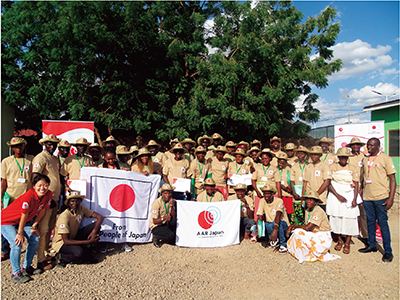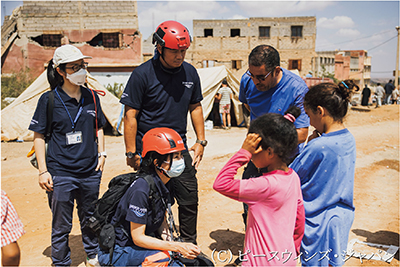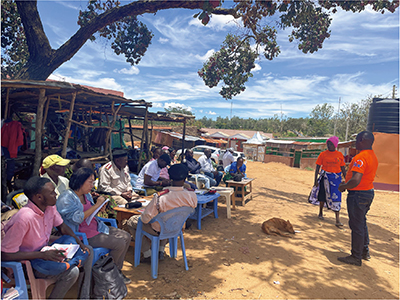(3) Cooperation with Japanese NGOs
Japanese NGOs implement development cooperation activities that directly benefit residents in accordance with their needs in various fields in developing countries and regions. Even in places affected by conflict or natural disasters, such as earthquakes and typhoons, they provide prompt and effective emergency humanitarian assistance. Being close to different local populations in developing countries, NGOs are capable of carefully tailoring responses to the needs of the local people. Accordingly, NGOs are well placed to provide assistance at the grassroots level, which can be hard-to-reach through the support of the government and international organizations. As the Government of Japan newly positions Japanese NGOs that engage in “visible development cooperation” as strategic partners in development cooperation, its collaboration with the NGOs is centered around the three pillars of assistance: financial cooperation for NGO projects, support to capacity building of NGOs, and dialogues with NGOs (see also the MOFA websiteNote 6 for more information on international cooperation and NGOs).
A. Financial Cooperation for NGOs’ Projects
The Government of Japan cooperates with Japanese NGOs in various ways and helps them smoothly and effectively carry out projects in development cooperation and emergency humanitarian assistance in developing countries and regions.
■ Grant Assistance for Japanese NGO Projects

Local residents participating in training provided by a Japanese NGO as part of efforts to address the risk of children dropping out of school (Grant Assistance for Japanese NGO Projects) (Photo: AAR Japan [Association for Aid and Relief, Japan])
The Government of Japan, through the Grant Assistance for Japanese NGO Projects, provides financial support to the socio-economic development projects that Japanese NGOs implement in developing countries. The grant covers a wide range of fields, such as health, medical care and sanitation, rural development, assistance for persons with disabilities, education, disaster risk reduction, and landmine and unexploded ordnance (UXO) disposal. In FY2022, 57 Japanese NGOs received grants under the scheme, to implement 117 projects in 41 countries and 1 region, amounting to approximately 7 billion yen (see also “Featured Project”).
■ Japan Platform (JPF)

Japanese NGO staff conducting an emergency initial assessment in the affected area two days after the earthquake occurred in central Morocco (Japan’s emergency humanitarian assistance through JPF) (Photo: Peace Winds Japan)
Japan Platform (JPF)Glossary supports and coordinates emergency humanitarian activities of NGOs in cooperation with Japanese NGOs, the business community, and the government. In FY2022, JPF implemented 142 projects under 18 programs, including Response to Iraq and Syria Humanitarian Crisis, Response to Afghanistan Humanitarian Crisis, Myanmar Displaced Persons Humanitarian Assistance, Humanitarian Assistance for Palestine/Gaza, Humanitarian Response to South Sudan Conflict, Humanitarian Response to Ethiopia Conflict, Response to Ukraine Humanitarian Crisis, Emergency Response to Pakistan Floods, Emergency Response to Southeast Türkiye Earthquake, and Response to Food Crisis (see also “Japan’s Efforts in Ukraine and Its Neighboring Countries” and “Featured Project”). As of December 2023, 47 NGOs are registered with JPF.
■ NGO Project Subsidies
NGO Project Subsidies is another form of financial support from the Government of Japan available to Japanese NGOs. The scheme supports three types of projects: “research projects” that identify and formulate development cooperation projects and conduct post-project evaluations, “international cooperation-related projects in Japan” and “international cooperation-related projects based overseas,” which support the organization of and participation in training sessions and lectures in Japan and abroad with the aim of helping applicant NGOs expand and strengthen their international cooperation operations. In FY2022, the Government of Japan provided NGO Project Subsidies to six Japanese NGOs, and supported project formulation studies, post-project evaluations, and organization/participation in seminars and workshops including those held online, in Japan or abroad.
■ JICA Partnership Program (JPP)

An NPO, Mirai Future of Kenya, and community volunteers conducting early pregnancy preventive activities at a community meeting in Machakos County, Kenya (JICA Partnership Program)
The JICA Partnership Program (JPP) is an effort in international cooperation where interested entities such as Japanese NGO/Civil Society Organizations (CSOs), other private organizations, local public entities, or universities assist local citizens in developing countries in getting involved in the economic and social development or reconstruction in their own areas. Leveraging their own technologies, knowledge, and experience, applicant organizations propose projects to JICA. Then, upon the approval of JICA, the organizations are contracted to implement the projects (see the JICA websiteNote 7 for information on program details among others). Through JPP, approximately 200 projects are implemented every year. The number of the countries where JPP operates has reached a cumulative total of approximately 80.
B. Support to Improve the Enabling Environment for NGOs
In response to the growing importance of activities by non-governmental actors and the use of private funding in international cooperation, MOFA carries out the following programs with the objective of further strengthening the organizational structures and project implementation capabilities of Japanese NGOs and developing their human resources.
■ NGO Consultant Scheme
Under this scheme, MOFA commissions highly experienced Japanese NGOs throughout Japan as “NGO Consultants” who are tasked to address inquiries and respond to requests for consultation from citizens and NGOs on such topics as international cooperation activities by NGOs, procedures to establish an NGO, organizational management and operation, and approaches for providing development education. In FY2022, MOFA commissioned 15 organizations that handled more than 10,000 questions and inquiries and provided 120 on-site services.Note 8
■ NGO Internship Program/NGO Study Program
MOFA implements the NGO Internship Program and NGO Study Program in support of organizational development through human resources development. The NGO Internship Program is designed to train younger generations who can play a leading role in Japanese NGOs in international cooperation in the future. A total of seven interns were accepted by NGOs through this program in FY2022.
Under the NGO Study Program, mid-career staff from Japanese NGOs in international cooperation undergo domestic and overseas training. Upon completion of training, they are expected to share their experience and learning widely within their organization and with other NGOs, and contribute to enhancing the capacity of Japanese NGOs as a whole. In FY2022, eight people received training under this program.
■ NGO Study Group
MOFA supports research activities conducted by multiple NGOs to improve their own project implementation capacity and expertise. The NGO Study Group hosted by MOFA aims to strengthen the organization and capacity of NGOs. Under specific themes facing the NGO community, each study group is organized to undertake a range of activities, including joint studies and research, seminars, workshops, symposiums, etc., and produce reports and make specific recommendations for performance improvement. In FY2022, the NGO Study Group focused on two themes: (i) “Issues and Practice Toward Gender Mainstreaming in International Cooperation,” and (ii) “Redesigning Fund Raising Methods and Financial Standing of Japanese NGOs.” The reports and outputs of these activities are available on the MOFA websiteNote 9 (in Japanese only).
C. Dialogue with NGOs (NGO-Ministry of Foreign Affairs Regular Consultation Meetings and NGO-JICA Dialogue Meeting)
In FY2022, the Plenary of the NGO-Ministry of Foreign Affairs Regular Consultation MeetingGlossary was held in November. The meeting of a subcommittee, namely the “Partnership Promotion Committee,” took place in July and December 2022 and March 2023, and the “ODA Policy Council” met in July and November 2022 and March 2023. The number of these meetings was the same as before the spread of COVID-19. An extraordinary general meeting on the revision of the Development Cooperation Charter was also organized in September 2022, featuring lively exchanges of views (see the MOFA websiteNote 10 for more information on the NGO-Ministry of Foreign Affairs Regular Consultation Meeting, meeting minutes, and other details).
JICA holds the NGO-JICA Dialogue Meeting to engage in dialogue and collaboration with NGOs. Two meetings took place online in FY2022, with participation of 40 organizations in the first meeting and 25 organizations in the second meeting (see the JICA websiteNote 11 for more information on the NGO-JICA Dialogue Meeting, meeting minutes, and other details).
Glossary
- Japan Platform (JPF)
- An emergency humanitarian aid organization established in 2000 in partnership with NGOs, the government, and the business community. JPF aims to support and coordinate with Japanese NGOs to ensure their rapid and effective emergency humanitarian aid activities in the event of a large-scale natural disaster or conflict that causes a vast number of refugees or displaced persons, etc. JPF utilizes ODA funds from the Government of Japan, as well as donations from companies and citizens to provide emergency humanitarian assistance, including the distribution of food/non-food items, and support to rebuild lives, in the situation of a large-scale natural disaster or a vast number of refugees or displaced persons fleeing from conflicts.
- NGO-Ministry of Foreign Affairs Regular Consultation Meeting
- In order to promote a stronger partnership and dialogue between NGOs and MOFA, the NGO-Ministry of Foreign Affairs Regular Consultation Meeting was launched in FY1996 for sharing information on ODA and regularly exchanging opinions on measures for improving partnerships with NGOs. It comprises the Plenary and two subcommittees: the “ODA Policy Council” and the “Partnership Promotion Committee.”
- Note 6: Cooperation with NGOs https://www.mofa.go.jp/policy/oda/page_000025.html
- Note 7: JICA Partnership Program https://www.jica.go.jp/english/activities/schemes/partner/partner.html
- Note 8: Consultation and lecture services at events related to international cooperation, provided in cooperation with local governments and partner organizations.
- Note 9: The reports of NGO Study Group https://www.mofa.go.jp/mofaj/gaiko/oda/shimin/oda_ngo/houkokusho/kenkyukai.html (in Japanese only)
- Note 10: NGO-Ministry of Foreign Affairs Regular Consultation Meetings https://www.mofa.go.jp/mofaj/gaiko/oda/shimin/oda_ngo/taiwa/kyougikai.html (in Japanese only)
- Note 11: Regular meetings with NGOs https://www.jica.go.jp/partner/ngo_meeting/index.html (in Japanese only)
